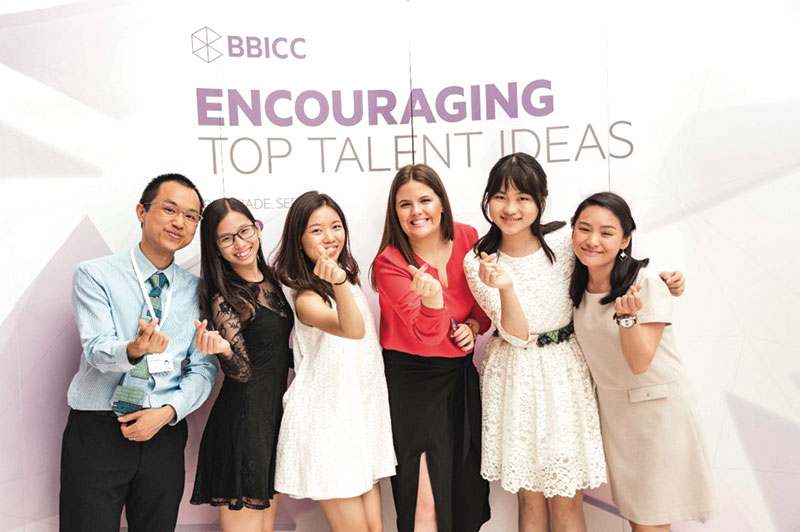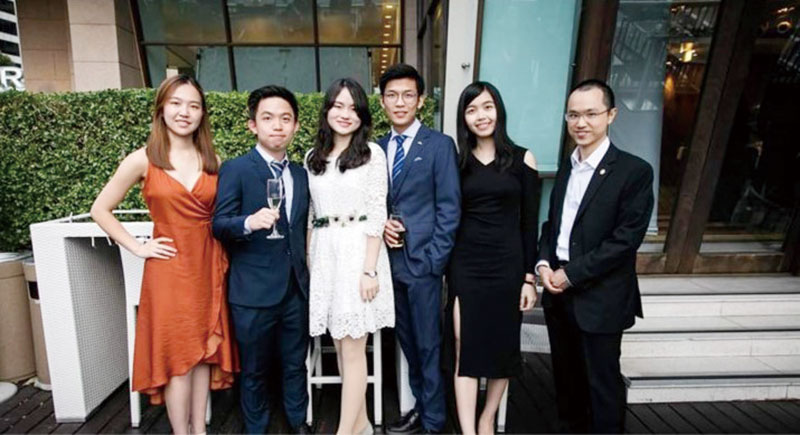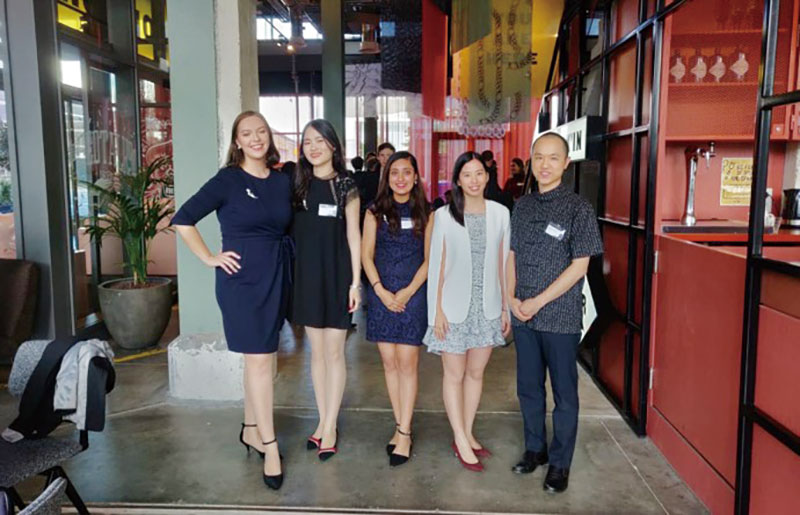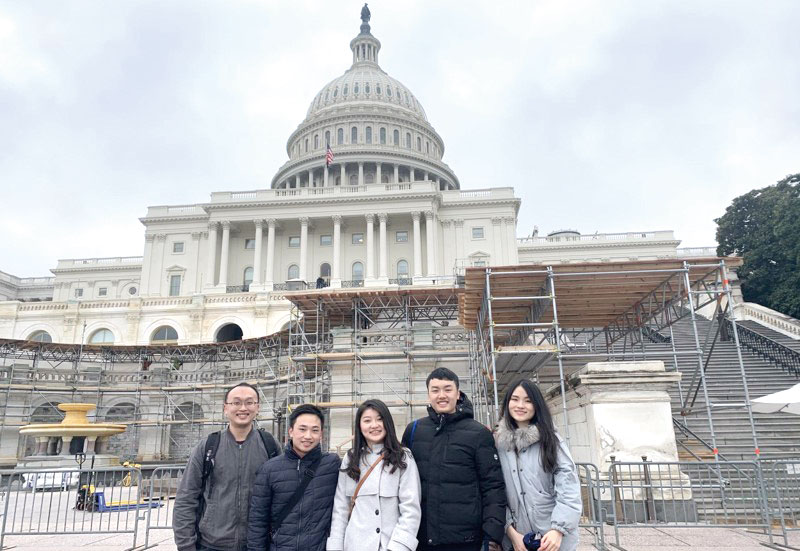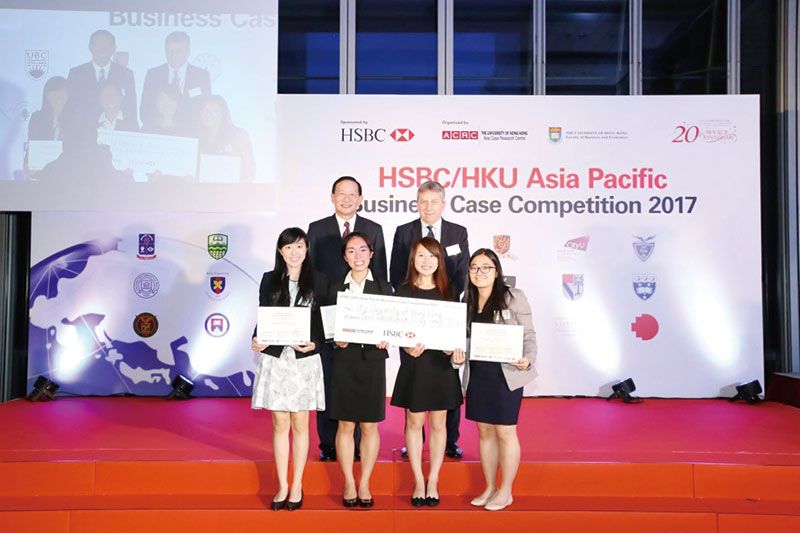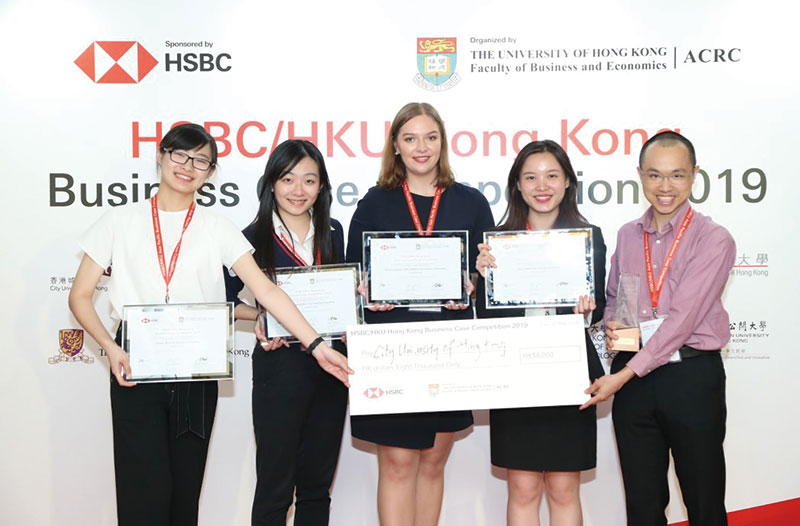Students and teacher talk about
their shared case competition journey
This article is an edited and condensed version of a conversation that took place on 26 January 2021.
List of acronyms
- CB = The College of Business at City University
- BCC = Business Case Competition
- ICC = International Case Competition
- CB3045 = A case consulting course offered by CB, which was developed and taught by Dr Zachary Leung
Could you introduce yourselves briefly for the
benefit of our readers?
 |
Ms Frances Fung (FF)
BBA Business Operations Management (2019)
I'm from Hong Kong, and I'm working as a Digital
Senior Analyst at Accenture. |
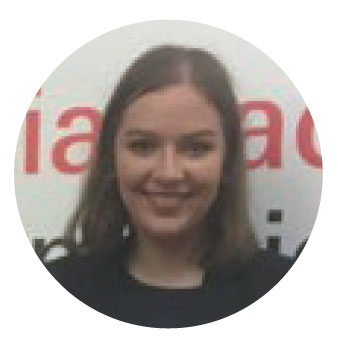 |
Ms Martyna Chmielewska (MC)
BBA Business Economics (final year)
I'm from Poland, and I'm working part-time as a
junior marketing executive at Oxygen Inbound. |
 |
Dr Zachary Leung (ZL)
PhD Operations Research from MIT (2014)
I'm from Singapore, and I've been working as
an Assistant Professor in the Department of
Management Sciences since 2015. |
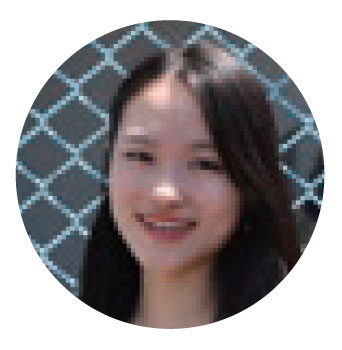 |
Jessie Cheng (JC)
BBA Accountancy (2020)
I'm from China, and I'm working as a financial
analyst at J.P. Morgan. |
 |
Mr Ronny Torres (RT)
BBA Global Business (second year)
I'm from Colombia, and I'm working as a teaching
assistant for Dr Leung in the course CB3045. |
What are the eight competitions in your global
journey?
ZL : They are: (1) the HSBC/HKU BCC that we're invited
to each year; (2) the BBICC 2018 in Belgrade, Serbia; (3)
the AUBCC 2018 in Sydney, Australia; (4) the ICC@M
2019 in Maastricht, The Netherlands; (5) the NHHICC
2019 in Bergen, Norway; (6) the MBSC 2020 in
Washington DC, USA; (7) the UNICC 2020 in Navarra,
Spain, which was cancelled due to COVID-19; and (8)
the VCC 2020 which was run virtually and organised
by Universidad Panamericana in Guadalajara, Mexico.
That's quite amazing — how did CityU get
invited to these case competitions?
ZL : I became the advisor/coach CityU's case competition
team in 2017. I was introduced to the advisor of the
University of Belgrade case competition team when our
team participated in the 2017 HSBC/HKU Asia Pacific
BCC. She graciously invited us to their university's ICC,
where I met other advisors, which led to invitations to
their case competitions, and the rest is history.
Dr Leung – Let's go back to the beginning, what
motivated you to develop the course CB3045 and
to coach our case competition team?
ZL : Initially, CB would send a team to participate in
the HSBC/HKU BCC each year, and it would arrange
one faculty member from each CB department to form
a committee to train the team for the competition. I
felt that this was a "too many cooks spoil the broth"
situation, because it was difficult for six busy faculty
members to coordinate how to best teach students.
I therefore decided to take upon the responsibility of
being the "main" coach for the case competition team.
I also decided to establish a formal university course
CB3045, because this would lead to a higher level of
commitment from students, as well as awarding them
with academic credit for their work and their skills
gained in the course.
Students – What attracted you to CB3045 and
case competitions?
JC : I met Dr Leung during the interview for the CB
Young Scholars Program. He encouraged me to take
CB3045, and I signed up because I wanted to try
something new.
FF : CB3045 sounded really interesting because
students were required to work in teams to solve
challenging real-life business case studies.
MC : When I was a student in CB3045, one of my
classmates was an exchange student who was a
member of the Queensland University of Technology's
case competition team. I was impressed and inspired
by how well she was able to present her ideas.
Belgrade Business International Case Competition at Belgrade, Serbia in April 2018
What was your experience in CB3045?
JC : I found CB3045 to be a challenging but rewarding
experience. The format of the course was very
different from other courses; for example, we had tight
deadlines (one week per case) to solve a business case
study with our team.
FF : I had the opportunity to work with classmates who
had different backgrounds and different working styles.
MC : I was surprised at how much public speaking
was required in CB3045. I used to feel very nervous
when speaking in public, but giving case presentations
in class and in competitions has helped me become
more comfortable with public speaking.
ZL : I had never taken a case competition course as a
student, so at the beginning, it was quite challenging for
me to teach CB3045. Over the years, I've gotten more
experienced and the structure of the course has improved
as a result. I'm also grateful for the support of CB colleagues
such as Dr Chak-fu Lam (Management), Dr Alvin Leung
(Information Systems), and Dr Huazhong Zhao (Marketing),
who have participated in CB3045 as guest lecturers, helping
us with cases related to their areas of expertise.
How do you prepare to take part in an ICC?
FF : After we were selected into the case competition
team, we would spend our weekends together to train
and prepare for the upcoming ICC. We would work
together to solve various cases, and discuss how to
improve our time management and slide-making. We
would also learn from the top global teams by watching
and analysing their case presentations, and incorporating
some of the things they did into our own playbook.
Australian Undergraduate Business Case Competition at Sydney, Australia in Novermber 2018
MC : The HSBC/HKU BCC uses a very diverse set of
cases, covering topics from marketing to HR to crisis
management, so solving a variety of cases during the
training sessions really broadened our general business
knowledge.
What happens during an international case
competition?
ZL : In an ICC, teams of 4 from top global business
schools travel to the organising university. Teams are
given a case study about a client company, and the
goal is deliver the most persuasive recommendation
for the client via an oral presentation, supported by
PPT slides. A key feature of ICCs is the short casesolving
time: 3–6 hours for short cases; and 24 hours
for long cases. Most ICCs take place over 5 calendar
days, so the schedule is really packed – for example,
there could be 4 full days allocated to case-solving and
presentations, leaving only evenings and one full day
for socialising and recreation. It also takes two full days
that we spend travelling to the competition location
and back to HK; but we try to arrive a day or two early
to get over the jet lag, and to spend some extra time
doing touristy things.
MC : Although the primary goal of an ICC is working
hard and competing, it's also a great place to network
with students from top global business schools, and to
learn about their culture.
International Case Competition at Maastricht, Netherlands in April 2019
International travel sounds fun but also
expensive – how much does it cost students
to participate in an ICC? Does CB provide any
financial support?
ZL : We're really grateful for CB's generous financial support, which covers all competition-related expenses.
The students don't have to pay for anything, except
their own meals.
What did you learn from interacting with
students from the world's top business schools?
MC : I learnt from Copenhagen Business School
students that we need to be more decisive in zeroing in
on our solution.
JC : I heard from some teams that they're forced to
learn on their own because their advisors are too busy
to give them guidance. I realised that the CityU teams
are really fortunate to have Dr Leung, who is able to
spend a lot of time teaching and training us.
RT : I used to think the students at top business
schools were super geniuses; but after speaking with
them, I realised that they're just like us – we all find
the cases challenging, and we all have similar abilities
and opportunities to succeed, regardless of university
ranking or country of origin.
ZL : Our students definitely have the smarts and the drive
to succeed! We won the HSBC/HKU Asia Pacific BCC
in 2017, the HSBC/HKU Hong Kong BCC in 2019, and
placed third in the Universidad Panamericana VCC in
2020.
McDonough Business Strategy Challenge at Washington DC, US in February 2020
What is your favorite memory from an ICC?
JC : I was proud of how our team at AUBCC 2018 was
able to stay positive despite adversity. There were three
rounds of competition, and our team at the time was
quite inexperienced, so we came in fourth out of four
teams in our division for rounds 1 and 2. For the third and final round, we trusted our gut and went for an
out-of-the-box solution, which earned us second place!
FF : We became really good friends during the
competition in Maastricht, and we still find time to
hang out nowadays.
The CityU team won US$ 10,000 as the champion of the HSBC/HKU Asia Pacific Business Case Competition 2017
What is the most difficult part of an ICC?
ZL : During an ICC, students are required to solve a
complex case within a very short period of time, usually
around 24 hours, so students are super stressed and
exhausted. It's not surprising that interpersonal conflicts
can arise, like a reality TV show. I have heard from several
teams where students found it frustrating to work with a
teammate who was stubborn or unable to take criticism.
Has participating in case competitions been
helpful to your career?
FF : It was really helpful. I use case-solving frameworks
everyday in my work as a consultant. My colleagues
are often surprised that I'm a fresh graduate, as I
demonstrate a deeper business sense compared to my
peers. I'm also confident about my ability to speak off
the cuff; for example, there was an occasion when I had
to give a presentation in place of my manager who was
suddenly unable to attend, and I hit it out of the park.
JC : It has helped me especially in how I organise
my ideas, and how it's essential to have a good
understanding of the bigger picture. If you need to
solve a problem, and communicate your solution to
others, you'll definitely benefit from CB3045.
ZL : Teaching CB3045 and working with students for
ICCs has helped me develop into a more effective
communicator and teacher. I've learnt how to structure
my ideas better, and also how to arouse the interest of
students by presenting course material in an engaging
manner.
The CityU team was the champion of the HSBC/HKU Hong Kong Business Case Competition 2019
Case-solving sounds like an amazing experience!
Would you recommend CB3045 and ICCs to all CB
undergraduate students?
FF : It's not all fun and games – you do need to be
extremely motivated, and put in the time and energy
for weekend training sessions.
ZL : Case-solving is really meaningful and fun, but
it's also hard. I've found that not all students are
comfortable with the complex and open-ended
situations that they encounter in business case studies.
Any final advice for students who are interested
in CB3045 and/or ICCs?
MC : You can feel overwhelmed at first, but don't
despair. All of us started with zero experience in case
solving, and practice makes perfect!
FF : Having a growth mindset is essential. Do listen to
feedback from your peers and Dr Leung.
JC : Don't be afraid to ask questions!
ZL : Try to make it easy for your audience to understand
your ideas by putting yourself into their shoes.





